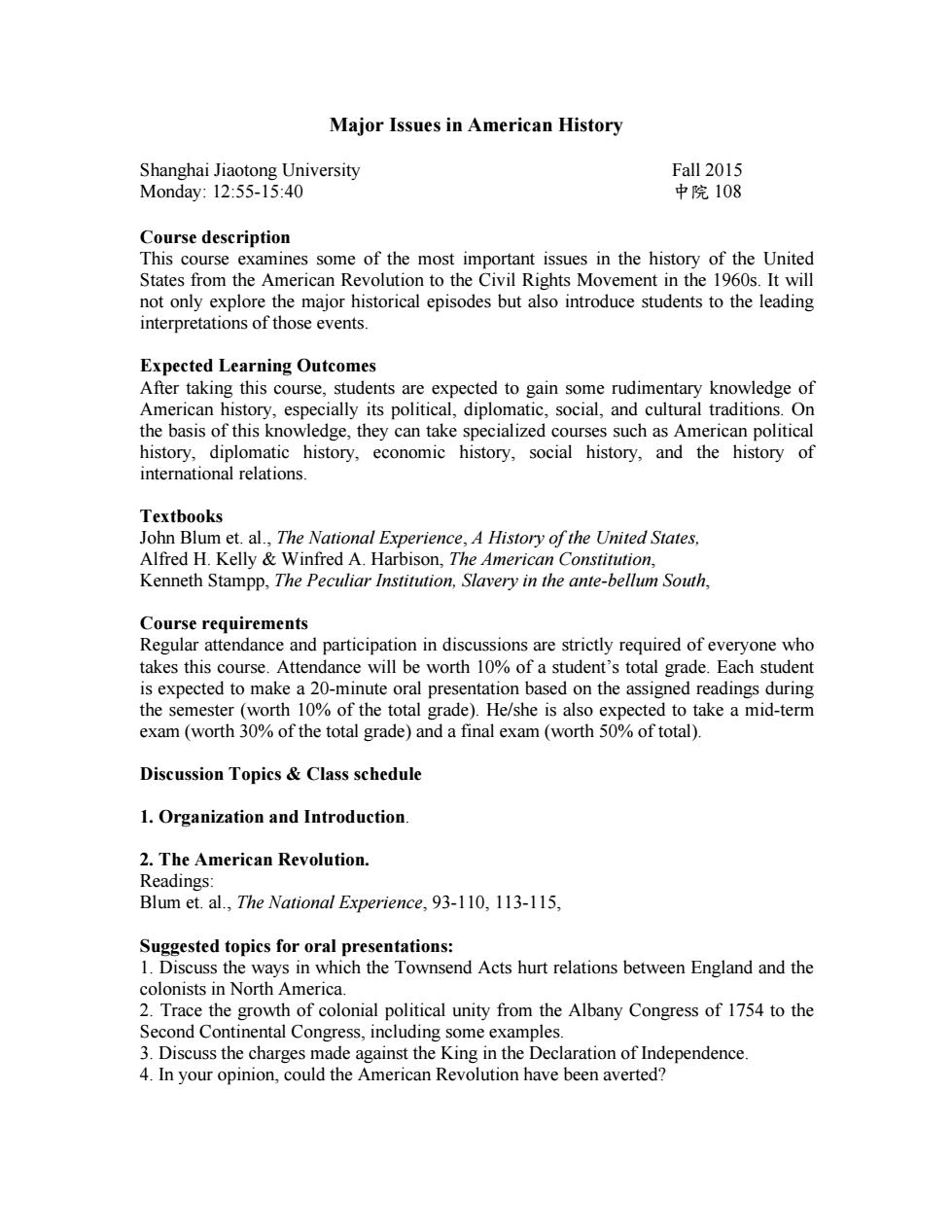正在加载图片...

Major Issues in American History Shanghai Jiaotong University Fall 2015 Monday:12:55-15:40 中院108 Course description This course examines some of the most important issues in the history of the United States from the American Revolution to the Civil Rights Movement in the 1960s.It will not only explore the major historical episodes but also introduce students to the leading interpretations of those events. Expected Learning Outcomes After taking this course,students are expected to gain some rudimentary knowledge of American history,especially its political,diplomatic,social,and cultural traditions.On the basis of this knowledge,they can take specialized courses such as American political history,diplomatic history,economic history,social history,and the history of international relations. Textbooks John Blum et.al.,The National Experience,A History of the United States, Alfred H.Kelly Winfred A.Harbison,The American Constitution, Kenneth Stampp,The Peculiar Institution,Slavery in the ante-bellum South, Course requirements Regular attendance and participation in discussions are strictly required of everyone who takes this course.Attendance will be worth 10%of a student's total grade.Each student is expected to make a 20-minute oral presentation based on the assigned readings during the semester (worth 10%of the total grade).He/she is also expected to take a mid-term exam (worth 30%of the total grade)and a final exam (worth 50%of total). Discussion Topics Class schedule 1.Organization and Introduction 2.The American Revolution. Readings: Blum et.al.,The National Experience,93-110,113-115, Suggested topics for oral presentations: 1.Discuss the ways in which the Townsend Acts hurt relations between England and the colonists in North America. 2.Trace the growth of colonial political unity from the Albany Congress of 1754 to the Second Continental Congress,including some examples. 3.Discuss the charges made against the King in the Declaration of Independence. 4.In your opinion,could the American Revolution have been averted?Major Issues in American History Shanghai Jiaotong University Fall 2015 Monday: 12:55-15:40 中院 108 Course description This course examines some of the most important issues in the history of the United States from the American Revolution to the Civil Rights Movement in the 1960s. It will not only explore the major historical episodes but also introduce students to the leading interpretations of those events. Expected Learning Outcomes After taking this course, students are expected to gain some rudimentary knowledge of American history, especially its political, diplomatic, social, and cultural traditions. On the basis of this knowledge, they can take specialized courses such as American political history, diplomatic history, economic history, social history, and the history of international relations. Textbooks John Blum et. al., The National Experience, A History of the United States, Alfred H. Kelly & Winfred A. Harbison, The American Constitution, Kenneth Stampp, The Peculiar Institution, Slavery in the ante-bellum South, Course requirements Regular attendance and participation in discussions are strictly required of everyone who takes this course. Attendance will be worth 10% of a student’s total grade. Each student is expected to make a 20-minute oral presentation based on the assigned readings during the semester (worth 10% of the total grade). He/she is also expected to take a mid-term exam (worth 30% of the total grade) and a final exam (worth 50% of total). Discussion Topics & Class schedule 1. Organization and Introduction. 2. The American Revolution. Readings: Blum et. al., The National Experience, 93-110, 113-115, Suggested topics for oral presentations: 1. Discuss the ways in which the Townsend Acts hurt relations between England and the colonists in North America. 2. Trace the growth of colonial political unity from the Albany Congress of 1754 to the Second Continental Congress, including some examples. 3. Discuss the charges made against the King in the Declaration of Independence. 4. In your opinion, could the American Revolution have been averted?